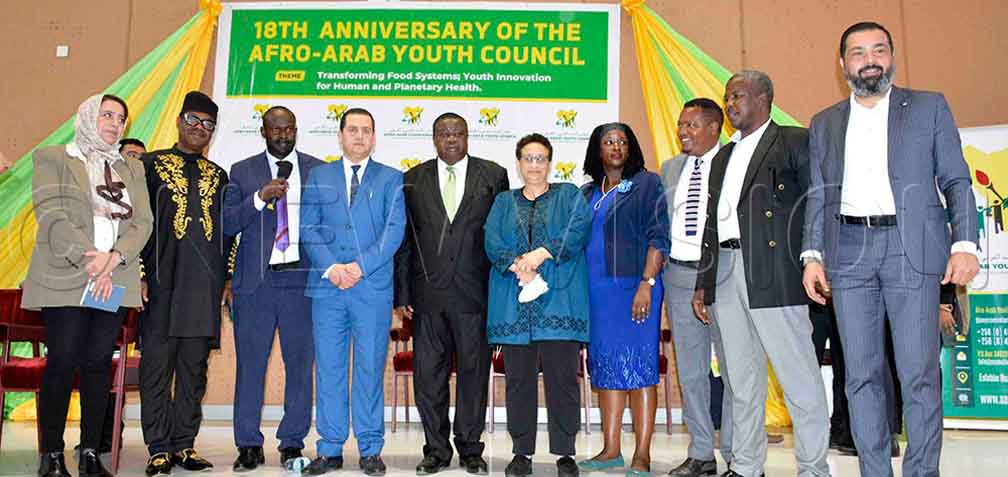- March 10, 2022
- Posted by: aaycweb
- Category: Lates News

Delegates urged African and Arab countries to move beyond the flowery speeches of unity,
partnership, cooperation to transpose into practical activities and actions to transform the
two worlds.
Ebenezer Oyetakin the chairman supervisory audit committee from Nigeria said that many
parents in Africa are encouraging their children not to participate in Agriculture.
“Agriculture is seen as a job for the disadvantaged, the illiterate, those who are not well to
do. Parents tell their children to go to school and not join them in farming. They associate
framing and agriculture with poverty, tedious work,” Oyetakin said.
This was during the closure of the 18th-anniversary celebration of Afro Arab Youth Council
that was held at Makerere University Central Teaching Facility Two Auditorium on Tuesday.
It was attended by delegates from Africa and Arab countries.
Oyetakin said that the tedious process in agriculture should be overcome by the provision
of technology and machines, such as tractors. He noted that there were graduates of
agriculture who do not love the soil which is a contradiction. He explained that a few years
ago, 95% of the rice that was eaten in Nigeria was imported.
He said the 3.5 million rice farmers then suffered as Nigerians could not buy their rice
condemning the rice falsely for containing stones. He said that with government
interventions there are now 15 million rice farmers in Nigeria and the landscape has
changed with many rice millers, processors, and stores. He said Nigeria can now produce
90% of its rice and imports have been reduced and no one complains of stones in the local
rice.
David Gonahasa, the chief executive officer at Tripesaa, Uganda technology company said
agriculture value chains provides many opportunities for technology applications to be
developed. Gonahasa explained that the applications can be developed by identifying a
problem, putting together a team to build a prototype and seeking resources to develop the
solution. He noted that the mindset that capital was the first thing to develop an application
or start a business was incorrect.
A delegate from Bahrain said education system in Africa and the Arab needs to skill youth
to make them part of the economy. While a delegate from South Africa said that many
Chinese, Pakistanis are flooding planes to fly into Africa which many Africans are running
away from. He said that the African Union and governments need to develop policies, laws
that serve Africa. A delegate from Morocco said that Africa must be developed by Africans.
The conference discussed how to transform food systems in the two worlds, the role of
youth in agriculture, Afro Arab partnership opportunities, and weaknesses.
Dr Fred Muhumuza an economics lecturer at the Makerere University College of Business
and Management Studies said that Uganda spends billions of shillings importing
foodstuffs that can be produced in the country.
Muhumuza said Uganda needs to develop technologies that can produce high quantities of
standard products and services. He cited that if Uganda was asked to supply 10,000 goats
per week it would fail because she lacks the science, technology, and capacity to do.
He said Africa needs to raise the food standards to increase exports within and outside the
continent and reduce imports. “KFC does not buy Irish potatoes, chicken produced from
Uganda because Uganda does not meet the specifications. Youth can produce rice that is
heavily consumed,” Muhumuza said.
Yusuf Welunga president Uganda National Students Association asked the youth should
stop the negative mindset towards agriculture. Welunga urged the government to manage
the low prices of agricultural produce which is discouraging farming.
Boniface Okot (Northern) said the Afro Arab solidarity was important for prosperity. He said
working in Arab countries should be safe for Africa’s youth that are traveling there.
The council was celebrating 18 years of existence which was concluded by a dialogue
under the theme: ‘Enhancing food security through innovations for planetary health: the role
of youth”. The Arab world imports 40% of the food it consumes with many African countries
being net importers of food. Africa with the largest arable land in the world has the
potential to produce food for its people and earn foreign exchange through exports to the
Arab world.
